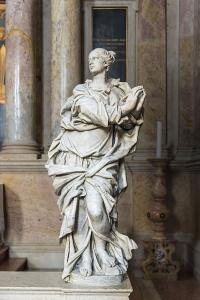 As I have often revealed in these essays, I am a 50-year United Methodist clergyman, and, though I have long had a love-hate relationship with my denomination, especially with regard to its absurd and frightening rejection of full inclusion of GLBTQIA people, I have stayed on the Methodist bus, in the main, though with a 5-year detour among the Presbyterians. And because I am still a member of the UM clergy, I continue to receive any number of communications from the denomination. Now that I live in Southern California, that message flood has hardly slowed. Yesterday, I received a note from the bishops of my church, saying that, in agreement with the call of Pope Francis, we were enjoined to “pray for the eradication of the Covid-19 virus from the earth.”
As I have often revealed in these essays, I am a 50-year United Methodist clergyman, and, though I have long had a love-hate relationship with my denomination, especially with regard to its absurd and frightening rejection of full inclusion of GLBTQIA people, I have stayed on the Methodist bus, in the main, though with a 5-year detour among the Presbyterians. And because I am still a member of the UM clergy, I continue to receive any number of communications from the denomination. Now that I live in Southern California, that message flood has hardly slowed. Yesterday, I received a note from the bishops of my church, saying that, in agreement with the call of Pope Francis, we were enjoined to “pray for the eradication of the Covid-19 virus from the earth.”
Well, that sounded like a traditionally Christian thing to do, I thought. We have a problem, so we are asked to pray in response to that problem. The virus is sure a problem—no one would deny that—so like droughts, floods, mass shootings, tornadoes, hurricanes, wars, and on and on—Christians are called to prayer. Do not Christians pray? However, in the case of Covid-19, something about this call to prayer brought me up short. If our prayer to God—I assume it is to God that we pray—asks fervently to “eradicate Covid-19” from us, then what exactly do we expect our God to do? Ride down on a cherubim with divine Clorox in hand, spraying liberally in, under, and around each of us, so that the microbial beast will disappear? Look down from heaven, weep sad Godly tears, mutter a quiet “wait it out,” and turn to other matters? Tell us rather loudly that we need to wash our hands, stay home, and bump only elbows when and if we meet? I admit to you that I am not quite sure what we hope from our God when we pray such grand requests like virus eradication.
After all, when certain public evangelical types pray that hurricanes may move away from their places of ministry, only to have those storms strike someone else, I am moved to laughter and scorn, not deeper religious inquiries. Or when those same mountebanks announce that specific storms, or other so-called “acts of God,” are in reality punishments for one sort of sin or another—being gay, being adulterous, gambling overmuch, (fill in the blank with your sin)—I tend to cry, “blasphemy” or other appropriate anathemas at these claims. I was asked to preach some sermons in southern Mississippi, not ten days after the assault of Hurricane Katrina, and was told by more than one resident that the reasons given for the onslaught of the terrible storm by some of their preachers (not United Methodist, I hasten to add!) was the presence of gambling boats in the bay; one of those huge boats had washed up on the beach and had become entangled with a hotel there, proof, these certain preachers said, that God liked neither gambling nor the intimate things between unmarried people that tended to transpire in hotels! This supposed connection between ferocious wind and ferocious sin was said, I think, half in jest (though plainly not by the preachers making the claim), but several Methodist parishioners who relayed this information to me were not themselves altogether convinced that there was not some connection between poor prayer and the latest bad weather events.
So, how are we to pray for the eradication of Covid-19? Or are we to pray at all for such a specific response from our God? Just who is the God we are addressing in our prayer? For me, that is the question that demands answer before we can pray any prayer at all.
As usual, I am helped in this discussion by the Hebrew Bible in whose great debt I stand. There is, of course, a huge number of prayers in that corpus of literature, not all of which are confined to the book of Psalms, though that book offers nearly every sort of prayer that one can imagine. From my reading of this complex literature, I propose that three things may be said about prayer in the Hebrew Bible, and all three have important consequences for what we think we are doing when we pray to our God.
- The God of Israel is the God who offers the people an unbreakable covenant, founded in the unbreakable love that God showers upon us freely and reservedly, that love known as chesed. Because Israel was Israel due to that chesed, its prayer was always seen as real address to a real partner, God, anticipating a real reply. The examples of that interchange are to be found in numerous places: Ps. 40:1-2: “I waited in patience for YHWH who inclined to me and heard my cry;” Ps. 107:6: “They cried to YHWH in their trouble, and God delivered them from their distress;” Ps.116:1-2: “I love YHWH, because God has heard my voice and my supplications.” These are but three examples that could be easily multiplied. Unfortunately, too many Christian believers stop here, and imagine that if they pray correctly, or if thousands of people pray for the same thing, then God is duty bound to respond in the way expected. Hence, if all United Methodists add their voices to those of Roman Catholics, we can fully expect Covid-19 to be removed from us by the God who answers prayer. However, there is more to the prayer of Israel.
- Israel knew all too well that God did not always respond to their petitions in a direct reply that they demanded. One of the reasons the book of Job was composed in the exile of Israel was to announce clearly that prayer was not always answered as the prayer insisted. Job keeps commanding God to show up and tell him clearly why his great piety had not earned him the expected reward. God shows up all right, but God’s attention on weather, animals, and the abundant mysteries of creation, are hardly what Job asked for! Job demanded justice as he understood it, and God replies with talk of wind, snow, ice, lions, ravens, Behemoth, and Leviathan. Yet, God’s oblique answer to Job’s furious questions appears to provide something of an answer to Job, as Job 42:1-6 suggests. In addition, Ps.88 is a parade example that prayer is sometimes not answered at all. Thus, Israel concluded that however passionate the prayer, God’s answer may be odd, or there may be no answer forthcoming.
- In short, Israel’s prayer life has in it a kind of trusting naiveté, an open assurance about God and God’s freedom. Our scientific certainties hardly allow for such a stance before our God; if God will not reply as we want, then surely God cannot be trusted at all and we need not waste our time in prayer to such a heedless divinity. Because we think in this fashion, our prayers can become weak, not asking or imagining anything, since our God appears to pay no attention to what we ask for. Or prayer can become a kind of psychological game to make us feel better; well, we say, at least we can pray! This is the root of the now famous meme, “Our thoughts and prayers are with you,” making us feel smug but in effect doing very little of any value for the one we claim to pray for. Or our prayers become a group sharing, making us imagine that we are somehow doing something of real human value, but in effect we are offering little more than a sop to a crisis over which our powerful science has no control, like the Covid-19 virus.
So what should I do when I am asked to pray for the eradication of Covid-19? My initial thought when I read this summons was to reject the whole thing as an exercise in magical thinking; if enough pray with enough passion and energy God will hear— assuming God to be at an advanced age a bit hard of hearing—and will sweep the virus away. That simply cannot be what a call to pray can mean.
In the panentheistic way of construing God, you and I are a significant part of God, and thus when we pray we are also praying to ourselves, reminding us of our responsibilities toward justice and righteousness for all of God’s people. Hence, prayer to get rid of Covid-19 suggests washing our hands correctly and often, isolating ourselves from one another so as not to pass the virus on to others, being careful to clean any items carefully that one has brought in from outside the home. And, because I am 73 years old, being extra careful about each one of those practices. I am happy to join my bishops and my Roman Catholic brothers and sisters in a prayer to eradicate Covid-19, but I hardly expect a magical God to do it for me. This is a virus we must rid ourselves of, with the God who loves us always, but only our changed styles of living will do that ultimately. By all means, pray, but try to know as clearly as you can imagine exactly what it is you are doing when you voice that prayer.
(Images from Wikimedia Commons)











